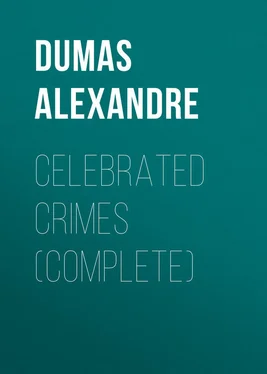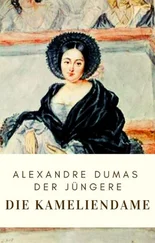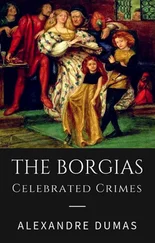Alexandre Dumas - Celebrated Crimes (Complete)
Здесь есть возможность читать онлайн «Alexandre Dumas - Celebrated Crimes (Complete)» — ознакомительный отрывок электронной книги совершенно бесплатно, а после прочтения отрывка купить полную версию. В некоторых случаях можно слушать аудио, скачать через торрент в формате fb2 и присутствует краткое содержание. Жанр: literature_19, foreign_antique, foreign_prose, на английском языке. Описание произведения, (предисловие) а так же отзывы посетителей доступны на портале библиотеки ЛибКат.
- Название:Celebrated Crimes (Complete)
- Автор:
- Жанр:
- Год:неизвестен
- ISBN:нет данных
- Рейтинг книги:3 / 5. Голосов: 1
-
Избранное:Добавить в избранное
- Отзывы:
-
Ваша оценка:
- 60
- 1
- 2
- 3
- 4
- 5
Celebrated Crimes (Complete): краткое содержание, описание и аннотация
Предлагаем к чтению аннотацию, описание, краткое содержание или предисловие (зависит от того, что написал сам автор книги «Celebrated Crimes (Complete)»). Если вы не нашли необходимую информацию о книге — напишите в комментариях, мы постараемся отыскать её.
Celebrated Crimes (Complete) — читать онлайн ознакомительный отрывок
Ниже представлен текст книги, разбитый по страницам. Система сохранения места последней прочитанной страницы, позволяет с удобством читать онлайн бесплатно книгу «Celebrated Crimes (Complete)», без необходимости каждый раз заново искать на чём Вы остановились. Поставьте закладку, и сможете в любой момент перейти на страницу, на которой закончили чтение.
Интервал:
Закладка:
The course that they took turned Cavalier's head more and more; for thanks to the injunctions of M. de Villars, all the orders that Cavalier gave were obeyed as if they had been issued by the governor himself. He had a court like a prince, lieutenants like a general, and secretaries like a statesman. It was the duty of one secretary to give leave of absence to those Camisards who had business to attend to or who desired to visit their relations. The following is a copy of the form used for these passports:
"We, the undersigned, secretary to Brother Cavalier, generalissimo of the Huguenots, permit by this order given by him to absent himself on business for three days.
"(Signed) DUPONT.
"Calvisson, this – "
And these safe-conducts were as much respected as if they had been signed "Marechal de Villars."
On the 22nd M. de Saint-Pierre arrived from the court, bringing the reply of the king to the proposals which Cavalier had submitted to M. de Lalande. What this reply was did not transpire; probably it was not in harmony with the pacific intentions of the marechal. At last, on the 25th, the answer to the demands which Cavalier had made to M. de Villars himself arrived. The original paper written by the Camisard chief himself had been sent to Louis XIV, and he returned it with notes in his own writing; thus these two hands, to one of which belonged the shepherd's crook and to the other the sceptre, had rested on the same sheet of paper. The following is the text of the agreement as given by Cavalier in his Memoirs:
"THE HUMBLE PETITION OF THE REFORMERS OF
LANGUEDOC TO THE KING
"1. That it may please the king to grant us liberty of conscience throughout the province, and to permit us to hold religious meetings in every suitable place, except fortified places and walled cities.
'Granted, on condition that no churches be built.
"2. That all those in prison or at the galleys who have been sent there since the revocation of the Edict of Nantes, because of their religion, be set at liberty within six weeks from the date of this petition.
'Granted.
"3. That all those who have left the kingdom because of their religion be allowed to return in freedom and safety, and that their goods and privileges be restored to them.
'Granted on condition that they take the oath of fidelity to the king.
"4. That the Parliament of Languedoc be reestablished on its ancient footing, and with all its former privileges.
'The king reserves decision on this point.
"5. That the province of Languedoc be exempted from the poll tax for ten years, this to apply, to Catholics and Protestants alike, both sides having equally suffered.
'Refused.
"6. That the cities of Perpignan, Montpellier, Cette, and Aiguemortes be assigned us as cities of refuge.
'Refused.
"7. That the inhabitants of the Cevennes whose houses were burnt or otherwise destroyed during the war be exempt from taxes for seven years.
'Granted.
"8. That it may please His Majesty to permit Cavalier to choose 2000 men, both from among his own troops and from among those who may be delivered from the prisons and galleys, to form a regiment of dragoons for the service of His Majesty, and that this regiment when formed may at once be ordered to serve His Majesty in Portugal.
'Granted: and on condition that all the Huguenots everywhere lay down their arms, the king will permit them to live quietly in the free exercise of their religion.'"
"I had been a week at Calvisson," says Cavalier in his Memoirs, "when I received a letter from M. le Marechal de Villars ordering me to repair to Nimes, as he wished to see me, the answer to my demands having arrived. I obeyed at once, and was very much displeased to find that several of my demands, and in particular the one relating to the cities of refuge, had been refused; but M. le marechal assured me that the king's word was better than twenty cities of refuge, and that after all the trouble we had given him we should regard it as showing great clemency on his part that he had granted us the greater part of what we had asked. This reasoning was not entirely convincing, but as there was no more time for deliberation, and as I was as anxious for peace as the king himself, I decided to accept gracefully what was offered."
All the further advantage that Cavalier could obtain from M. de Villars was that the treaty should bear the date of the day on which it had been drawn up; in this manner the prisoners who were to be set at liberty in six weeks gained one week.
M de Villars wrote at the bottom of the treaty, which was signed the same day by him and M. de Baville on the part of the king, and by Cavalier and Daniel Billard on the part of the Protestants, the following ratification:
"In virtue of the plenary powers which we have received from the king, we have granted to the Reformers of Languedoc the articles above made known.
"MARECHAL DE VILLARS J. CAVALIER "LAMOIGNON DE BAVILLE DANIEL BILLARD
"Given at Nimes, the 17th of May 1704"
These two signatures, all unworthy as they were to stand beside their own, gave such great delight to MM. de Villars and de Baville, that they at once sent off fresh orders to Calvisson that the wants of the Camisards should be abundantly supplied until the articles of the treaty were executed – that is to say, until the prisoners and the galley slaves were set at liberty, which, according to article 2 of the treaty, would be within the next six weeks. As to Cavalier, the marechal gave him on the spot a commission as colonel, with a pension of 1200 livres attached, and the power of nominating the subordinate officers in his regiment, and at the same time he handed him a captain's commission for his young brother.
Cavalier drew up the muster-roll of the regiment the same day, and gave it to the marechal. It was to consist of seven hundred and twelve men, forming fifteen companies, with sixteen captains, sixteen lieutenants, a sergeant-major, and a surgeon-major.
While all this was happening, Roland, taking advantage of the suspension of hostilities, was riding up and down the province as if he were viceroy of the Cevennes, and wherever he appeared he had a magnificent reception. Like Cavalier, he gave leave of absence and furnished escorts, and held himself haughtily, sure that he too would soon be negotiating treaties on terms of equality with marshals of France and governors of provinces. But Roland was much mistaken: M. de Villars had made great concessions to the popularity of Cavalier, but they were the last he intended to make. So, instead of being in his turn summoned to Nimes, or Uzes, to confer with M. de Villars, Roland merely received an intimation from Cavalier that he desired to speak with him on important business.
They met near Anduze, and Cavalier, faithful to the promise given to M. de Villars, neglected no argument that he could think of to induce Roland to follow his example; but Roland would listen to nothing. Then, when Cavalier saw that arguments and promises were of no avail, he raised his voice in anger; but Roland, laying his hand on his shoulder, told him that his head was turned, that he should remember that he, Roland, was his senior in command, and therefore bound by nothing that had been promised in his name by his junior, and that he had registered a vow in Heaven that nothing would persuade him to make peace unless complete liberty of conscience were granted to all. The young Cevenol, who was unaccustomed to such language, laid his hand on the hilt of his sword, Roland, stepping back, drew his, and the consultation would have ended in a duel if the prophets had not thrown themselves between them, and succeeded in getting Roland to consent to one of their number, a man much esteemed among the Huguenots, named Salomon, going back to Nimes with Cavalier to learn from M. de Villars' own mouth what the exact terms were which Cavalier had accepted and now offered to Roland.
Читать дальшеИнтервал:
Закладка:
Похожие книги на «Celebrated Crimes (Complete)»
Представляем Вашему вниманию похожие книги на «Celebrated Crimes (Complete)» списком для выбора. Мы отобрали схожую по названию и смыслу литературу в надежде предоставить читателям больше вариантов отыскать новые, интересные, ещё непрочитанные произведения.
Обсуждение, отзывы о книге «Celebrated Crimes (Complete)» и просто собственные мнения читателей. Оставьте ваши комментарии, напишите, что Вы думаете о произведении, его смысле или главных героях. Укажите что конкретно понравилось, а что нет, и почему Вы так считаете.












